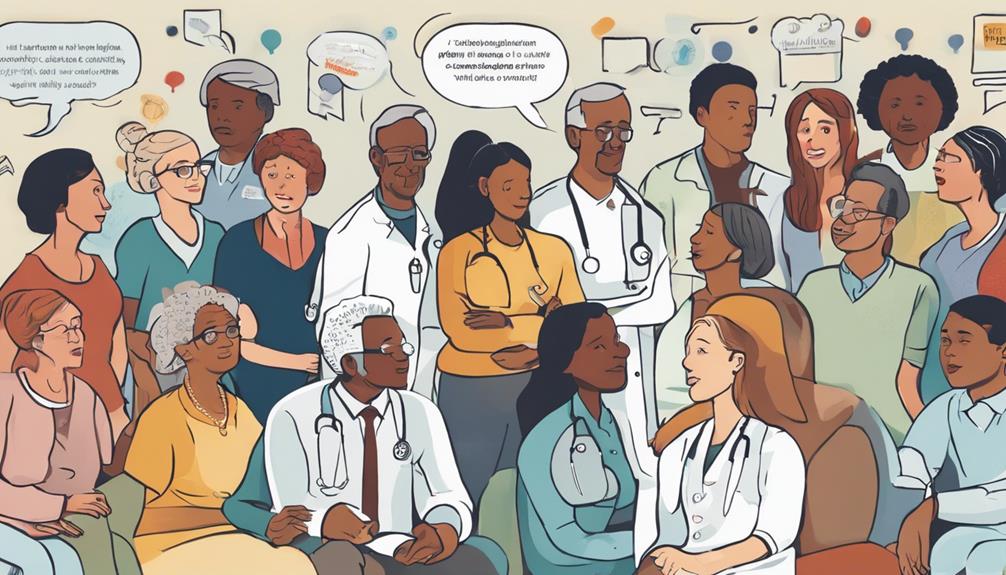When working with your home health care provider, it’s crucial to communicate with them about your medical history, medications, allergies, mobility, surgeries, care preferences, and goals. Your medical history is vital in creating personalized care plans for you. Allergies and chronic conditions information are essential for your safety. Mobility levels and surgeries play a key role in the care process. Sharing your care preferences ensures that you receive the care you require. Setting goals helps in effectively monitoring progress. Providing your provider with these details enables them to offer you the best possible care. For more information on receiving comprehensive care, click here.
Key Takeaways
- Detailed medical history and current medications are vital for personalized care plans.
- Allergies, chronic conditions, mobility level, and recent surgeries impact care provision.
- Patient preferences, goals, and expectations guide tailored care approaches effectively.
- Effective coordination of services prevents errors, enhances outcomes, and ensures comprehensive care.
- Open communication fosters collaboration, feedback utilization, timely care, and improved health outcomes.
Medical History and Medications
We need to provide a detailed medical history and list all current medications for effective home health care. Your health is our priority, and understanding your medical background and current medications is essential in creating a personalized care plan.
When we have a thorough understanding of your medical history, including past surgeries, chronic conditions, and current diagnoses, we can tailor our care to meet your specific needs.
Knowing all the medications you're currently taking, whether prescription drugs, over-the-counter medications, or supplements, with their dosages and frequencies, helps us guarantee your safety and well-being at home.
Allergies and Chronic Conditions

To ensure your safety and well-being during home health care, it's vital to inform your provider about any allergies you have and disclose any chronic conditions you're managing. Allergies can vary from medication and food allergies to environmental triggers, so sharing details on the severity and specific triggers of your allergies is essential. This information helps your provider create a personalized care plan that guarantees your safety and comfort.
Similarly, chronic conditions like diabetes, heart disease, or COPD require special attention. By providing your provider with detailed information about your chronic conditions, including current medications, treatments, and symptoms, you enable them to offer the appropriate care and support you need at home. Keeping a thorough list of your allergies and chronic conditions for quick reference will further aid your provider in delivering consistent and effective care tailored to your unique health requirements.
Mobility Level and Surgeries
How does evaluating a patient's mobility level and comprehending their surgical history benefit their home health care?
Assessing the mobility level allows us to understand how well a patient can move, use aids, and manage daily tasks at home. Knowing about recent surgeries is crucial for planning post-operative care, including mobility limitations and wound care. The surgical history informs us about the recovery timeline, potential issues, and rehabilitation goals.
By understanding mobility challenges post-surgery, we can create a personalized care plan focusing on enhancing mobility, preventing falls, and promoting independence. Recognizing the impact of surgeries on daily activities helps us provide the right support during recovery. This knowledge guides us in offering appropriate assistance tailored to the individual's needs.
We use this information to guarantee a smooth recovery process and help the patient regain their mobility effectively. By considering these factors, we can provide the best possible care for each patient's unique situation.
Preferences for Care

Evaluating a patient's mobility level and comprehending their surgical history directly influences the preferences for care in home health services. Preferences for care encompass specific medical treatments, therapy types, and assistance with daily activities.
Patients may express preferences related to medication management, dietary restrictions, and exercise routines. Home health care providers must be aware of cultural, religious, and personal beliefs that influence care decisions. These preferences can vary based on individual comfort levels, routines, and emotional needs.
Understanding patient preferences for care is essential as it promotes personalized, effective, and compassionate home health services. By acknowledging and respecting these preferences, providers can deliver care that aligns with the patient's unique needs and values. This personalized approach enhances the overall quality of care and fosters a trusting relationship between the patient and the provider.
Goals and Expectations
When establishing goals and expectations with your home health care provider, it's essential to clearly communicate what you hope to achieve regarding your health. Make sure to express your desired outcomes, whether it's recovering from an illness, regaining independence, or maintaining your current health status.
Care Plan Clarity
Ensuring clarity in the care plan's goals and expectations is essential for effective home health care provision. To achieve this, we must pay attention to specific details and communicate effectively with our patients. Here are five key points to keep in mind when focusing on care plan clarity:
- Clearly outline the patient's goals, treatment plan, and expected outcomes.
- Detail the specific services to be provided, including medications, therapies, and interventions.
- Understand the patient's preferences, limitations, and individual needs to tailor the care plan accordingly.
- Maintain regular communication and updates on the care plan to adapt to the patient's changing health status.
- Set clear goals and expectations in the care plan to monitor progress, assess effectiveness, and make necessary adjustments for the best care.
Communication Preferences
In our discussions with our home health care provider, it is important to clearly communicate our goals and expectations for the care we will receive. By sharing our communication preferences, medical condition details, treatment plan specifics, and any concerns we may have, we can guarantee that the care provided aligns with our needs. Effective communication is key to developing a thorough care plan that meets our individual requirements. It is also essential to be open to feedback and suggestions from our provider to enhance the quality of care. Regularly reviewing and updating our care plan with the provider allows us to address any changing needs or goals promptly.
| Communication Preferences | Medical Condition | Treatment Plan | Concerns |
|---|---|---|---|
| Clearly state preferences | Provide medical info | Discuss treatment | Share any concerns |
| Be open to feedback | Detailed condition info | Review plan regularly | Address questions |
| Share concerns openly | Treatment plan details | Update plan as needed | Seek clarifications |
Family and Caregiver Information

To guarantee effective communication and coordination, notify your home health care provider about any family members or caregivers involved in your care. Here are some key points to consider: This information allows the provider to maintain open lines of communication and ensure everyone is on the same page regarding your health and well-being. Additionally, it helps the provider offer personalized recommendations, including senior home care safety tips, to create a safe and supportive environment. By working together, you can help prevent accidents and ensure that the appropriate care is readily available when needed.
- Share details about family dynamics, roles, and responsibilities to create a supportive caregiving environment.
- Provide emergency contact information for family members and caregivers for urgent situations or changes in your health condition.
- Communicate any specific family preferences, routines, or cultural considerations that may impact the care provided.
- Discuss family concerns, expectations, or challenges related to caregiving to enhance the overall care experience.
- Collaborate with your home health care provider to make sure everyone is on the same page regarding your care needs, preferences, and goals.
Coordination of Services

Collaborating with various healthcare disciplines is essential for effective coordination of services in home health care. This involves guaranteeing seamless communication between medical professionals, caregivers, and patients. By organizing appointments, managing medications, and coordinating therapies, we provide all-encompassing care that enhances patient outcomes. Effective coordination helps prevent medical errors and improves the overall quality of care. It requires collaboration among disciplines like nursing, therapy, and social work. Communication and coordination are crucial for addressing changing patient needs, monitoring progress, and adjusting care plans accordingly.
| Benefits of Coordination | Description | Emotional Impact |
|---|---|---|
| Enhanced Patient Outcomes | Improves quality of care | Increased satisfaction |
| Prevents Medical Errors | Ensures safety and well-being | Peace of mind |
| All-Encompassing Care | Addresses all aspects of health | Feeling supported |
| Improved Communication | Ensures everyone is informed | Sense of unity |
| Collaborative Approach | Teamwork for better outcomes | Encouragement |
Effective coordination of services not only benefits the patients but also creates a supportive environment where medical professionals work together to provide personalized and holistic care.
Personalized Care Plan

When developing a customized care plan, our registered nurse takes into account the patient's distinct needs and goals.
This personalized approach guarantees that the medical services and therapies offered cater to the individual's specific conditions.
Patients Specific Needs
Crafting a personalized care plan in home health care involves tailoring specific services and interventions to address the unique needs and goals of each patient.
The registered nurse designs the care plan according to the patient's individual requirements.
Targeted therapies are incorporated to address the specific health conditions of the patient.
Caregivers are carefully selected based on their skills and compatibility with the patient.
The personalized care plan guarantees that the patient receives individualized attention and assistance.
It serves as a roadmap for the home health care team to coordinate and deliver effective care, meeting the patient's specific needs efficiently.
Tailored Care Approach
Our approach to providing tailored care in home health involves creating personalized care plans designed by registered nurses to meet each patient's specific needs, conditions, and goals. These personalized care plans are meticulously crafted to address the individual's medical needs and enhance their overall well-being.
By customizing the care plan for each patient, we guarantee that the services, treatments, and interventions provided are precisely tailored to their requirements. This approach not only aids in coordinating care between healthcare providers but also guarantees continuity of treatment, maximizing the effectiveness of the services delivered.
Through our personalized care plans, we can address unique challenges, preferences, and goals, ultimately enhancing the quality of care and improving patient outcomes.
Individualized Treatment Goals
In developing personalized care plans for home health patients, emphasis is placed on establishing individualized treatment goals tailored to their specific needs and preferences.
- The registered nurse creates a personalized care plan based on the individual's specific needs and goals.
- The care plan outlines necessary medical interventions, therapies, and services tailored to the patient's condition and preferences.
- Individualized treatment goals are vital for effective care delivery, ensuring the patient's well-being and recovery.
- The personalized care plan acts as a roadmap for the home health care provider, guiding them in delivering appropriate and targeted interventions.
- Regular assessments and adjustments to the care plan are made to guarantee treatment goals are met and the patient's progress is tracked effectively.
Open Communication

Successful home health care provision hinges on maintaining open communication between the provider and the patient to guarantee accurate information exchange for best care. It's essential for the provider to be aware of the patient's medical history, current symptoms, medications, and treatment preferences.
Patient feedback regarding comfort levels, pain management, and overall well-being is invaluable for tailoring care plans effectively. Any recent changes in the patient's condition or health status should be promptly communicated to the provider to secure timely and appropriate care.
Clear communication about the care plan, goals, and expectations fosters a collaborative and supportive relationship between the provider and the patient. By openly discussing medical history, symptoms, preferences, and feedback, both parties can work together to achieve the most favorable health outcomes.
Frequently Asked Questions
What Is the Most Common Home Care Service?
Skilled nursing is the most common home care service, providing medical care like wound care and medication management. Physical therapy helps with rehabilitation and mobility. Occupational therapy aids in regaining independence in daily activities.
What Is the Most Common Diagnosis for Home Health Care?
Heart failure, COPD, diabetes, post-surgical recovery, and mobility issues are common diagnoses in home health care. These conditions require specialized care and support in a home setting. Skilled nursing and therapy help patients manage their health challenges effectively.
What Is the Purpose of and Need for Home Health Care?
We aim to provide skilled medical care at home to help patients recover, regain independence, and manage conditions effectively. Our goal is to improve outcomes, prevent readmissions, and enhance quality of life by delivering personalized care in a familiar environment.
Does Medicare Pay for Home Assistant?
Yes, Medicare pays for some home assistant services, including skilled nursing care and therapy. However, Medicare does not cover non-skilled personal care like cooking or cleaning. It's important to understand Medicare guidelines and consult healthcare providers for coverage options.
Conclusion
To sum up, it's crucial for your home health care provider to have a comprehensive understanding of your medical history, medications, allergies, mobility level, and preferences for care.
By sharing this information openly and honestly, you can work together to create a personalized care plan that meets your needs and helps you achieve your goals.
For example, Mrs. Smith's provider adjusted her medication schedule to better manage her chronic pain, resulting in improved quality of life.
Remember, open communication is key to a successful home health care experience.









